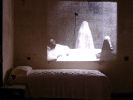Eye For Film >> Movies >> Father (2010) Film Review
This story of an elderly house in Spain's Basque country is less a straight forward narrative than impressionistic painting of the building and its hidden history. A caretaker (Luis Pescador) goes about his business, maintaining the place, occasionally sitting and letting the sound of singing wash over him from a neighbouring church. A village priest comes and goes and the film becomes punctuated with his chats with the caretaker, which tend to revolve around the passing of time and notions of mortality.
Shot over three years, the film treads a line between documentary and fiction - the house actually belongs to the director José María de Orbe and features the actual caretaker and a real priest, whose speech is unscripted, though the topics were suggested by Orbe - and it combines extreme naturalism with surprisingly avant-garde techniques. Although for the first part of the film we watch as the house is, in some ways, resurrected from the dead, seeing it reclaimed from nature and, to an extent restored, later in the film Orbe plays found footage - apparently dating from the very earliest days of Basque cinema - across its empty walls.

The result is incredibly atmospheric and not a little haunting, although Orbe has no interest in leading the viewer by the hand in terms of his ideas. Just as he shows the caretaker and priest in dialogue about the nature of time, and the house in dialogue with the past - so he throws out the echoes and suggestions of ideas, which an intrigued viewer may or may not want to think about.
That said, even Orbe himself admits that this is "a very personal film" and some will find it too personal for comfort. The lack of 'story' in its traditional sense is sure to leave many wondering why on earth they are staring at the empty rooms of a house for 85 minutes. Still, there is beauty in these spaces for those who are prepared to surrender themselves to the sedate rhythm of the film - and cinematographer Jimmy Gimferrer justifiably won a prize for his work here at the 2010's San Sebastian Film Festival. Orbe carefully chooses his shots to generate an emotional response to this abandoned property - here ratcheting up tension, there creating a feeling of serenity, but always using light and shade to paint a vivid, mysterious picture even if he doesn't provide any clearly defined answers to it.
Reviewed on: 28 Oct 2010If you like this, try:


















